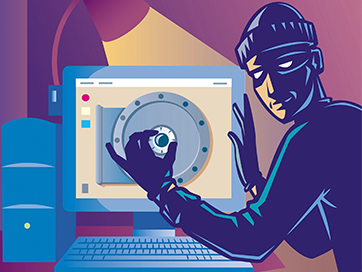![]() In order to understand what hacking is, it’s important to define the term in relation to coding.
In order to understand what hacking is, it’s important to define the term in relation to coding.
Like the alphabet is to creating a sentence, coding is the language of programming computer software and hacking is the ability to re-configure or re-program a system so it works in a way not originally intended by the creator.
Since 1822, when Charles Babbage created the difference engine and in 1939 when British engineers created an encryption machine during WWII, hacking has been around longer than most realize.

The negative connotation that now surrounds hacking hasn’t always been true to its purpose or use.
Fast-forward to today and hacking has become a front-page topic on a monthly basis.
Either a country is trying to hack another country, or an anonymous group of hackers is using their devious talent to take justice into their own hands and attach a common enemy of society.
As it has grown over the past few years, the degree of hacking has gone from attacking on a large scale to a very personal level.
Articles on phones being hacked are becoming ever more frequent and the threat of personal space and identity has become a reality. Having said this, it’s important to look at the big picture and understand that hacking is merely a tool derived from coding and as malicious as its current use is, it has equal opportunity to help protect and defend our personal and national interests.
The term hacker is difficult to define due to its multiple definitions throughout the history however today’s definition derived from MIT during the ‘80s.
MIT was the first school to offer classes in computer engineering and in the student’s free time, they would play with computer software, making it execute commands not originally intended by the creator.
The spirit of adventure drove these first steps by the new age hackers and once the World Wide Web was introduced, it could be done wirelessly and to other computers.
This new generation of hackers began using the Internet to push boundaries of what was possible.
They began to test their own creative computer based limits, trying to create chaos and destroy property on the largest scale possible.
The reason for these actions was and still is simply, “because I can.”
The first malwares to crash PC’s caused a Pac man to come on screen and the hard drives to fail, their victims watching helplessly as hackers continued to anonymously cause damage.
Hacks like these represented the height of public hacking exploration, but soon it turned into a commercial business.
As soon as hackers realized that they could turn their recreational activity into a financial institution, a great divide in the community occurred.
Derived from western movies, hackers began to associate themselves as either a ‘white hat’ or a ‘black hat’.
A ‘white hat’ hacker uses their skills in non-malicious purposes, either working to protect a company’s private information from ‘black hat’ hackers.
As it has grown over the past few years, the degree of hacking has gone from attacking on a large scale to a very personal level.
A ‘black hat ‘hacker uses their skills to break security systems, commit credit card theft, identity theft, and piracy.
The most recent incentive for hacking however is neither exploration or financial but political.
Hacking groups such as Jester, Wikileaks, and Anonymous believe that the depth to which they can hack should be feared by countries and corporations.
This new motivation has brought along with it the generation of hacking wars.
Now, between countries such as America and China, hacking is becoming a tool of warfare.
The Pentagon has set up Cybercom to respond to and to protect our classified information.
From controlling nuclear power plants to drones, hacking has become a serious player and a global threat.
However as soon as the ‘black hats’ figure out a new hack, it won’t be long before the ‘white hats’ figure it out and stop them in an endless cat-and-mouse game.





























